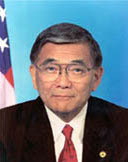Norman Mineta

Norman Yoshio Mineta (born November 12, 1931) is an American politician and member of the Democratic party. Mineta is currently serving as the United States Secretary of Transportation.
Mineta was born in San Jose, California. During World War II he was detained in an internment camp near Cody, Wyoming, along with hundreds of other Japanese Americans. While detained in the camp, Mineta, a Cub Scout, met fellow scout Alan K. Simpson, future Senator from Wyoming, who often visited the scouts in the detainment camp with his troop. The two became, and have remained, close friends and political allies.
He graduated from the University of California at Berkeley's Walter A. Haas School of Business in 1953. That year he joined the US Army and served as an intelligence officer in Japan and Korea. He then joined his father in the Mineta Insurance Agency.
His political career began in 1971 when he was elected mayor of San Jose, becoming the first Asian Pacific American mayor of a major U.S. city. As mayor, Mineta ended the city's 20 year old policy of rapid growth by annexation, creating development free areas in East and South San Jose. From 1975 to 1995 he sat in the United States House of Representatives representing the Silicon Valley. He co-founded the Congressional Asian Pacific American Caucus and served as its first chair.
Mineta served as chairman of the House Public Works and Transportation Committee between 1992 and 1994. He chaired the committee's aviation subcommittee between 1981 and 1988, and chaired its Surface Transportation Subcommittee from 1989 to 1991. During his career in Congress he was a key author of the landmark Intermodal Surface Transportation Efficiency Act of 1991. He also pressed for more funding for the Federal Aviation Administration (FAA). Mineta, with his friend Republican Senate Whip Alan Simpson, was also the driving force behind passage of H.R. 442, the Civil Liberties Act of 1988, which officially apologized for and redressed the injustices endured by Japanese Americans during World War II. In 1995, George Washington University awarded the Martin Luther King, Jr. Commemorative Medal to Mineta for his contributions to the field of civil rights.
After leaving the Congress, Mineta chaired the National Civil Aviation Review Commission, which in 1997 issued recommendations on reducing traffic congestion and reducing the aviation accident rate. Many of the commission's recommendations were adopted by the Clinton administration, including reform of the FAA to enable it to perform more like a business.
After serving as vice president at Lockheed Martin Corporation, he was appointed in 2000 by Bill Clinton as the United States Secretary of Commerce, making him the first Asian American to hold a post in the presidential cabinet.

He was appointed United States Secretary of Transportation by President George W. Bush in 2001, a post he was originally offered eight years previously by Bill Clinton. He is currently the only Democrat in Bush's cabinet and also the first Secretary of Transportation to have previously served in a cabinet position.
On September 21, 2001, Mineta sent a letter to all U.S. airlines forbidding them from profiling; or subjecting Middle Eastern passengers to an added degree of pre-flight scrutiny. He stated that it was illegal for the airlines to discriminate against passengers based on their race, color, national or ethnic origin or religion.
The Norman Y. Mineta San José International Airport in San Jose, California was named after him in November 2001 when Mineta was serving as Secretary of Transportation.
Mineta is married to Danealia (Deni) Mineta. He has two sons, David and Stuart Mineta, and two stepsons, Robert and Mark Brantner.
| Preceded by: William M. Daley |
Secretary of Commerce | Succeeded by: Donald Evans |
| Preceded by: Rodney Slater |
Secretary of Transportation | Succeeded by: None (Incumbent) |
